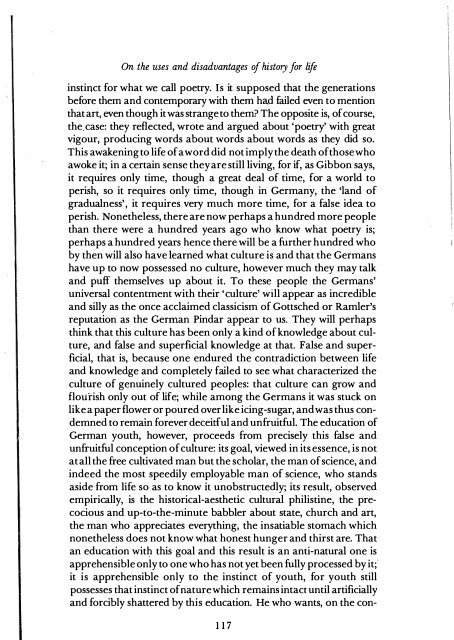Friedrich_Nietzsche - Untimely_Meditations_(Cambridge_Texts_in_the_History_of_Philosophy__1997)
Friedrich_Nietzsche - Untimely_Meditations_(Cambridge_Texts_in_the_History_of_Philosophy__1997)
Friedrich_Nietzsche - Untimely_Meditations_(Cambridge_Texts_in_the_History_of_Philosophy__1997)
You also want an ePaper? Increase the reach of your titles
YUMPU automatically turns print PDFs into web optimized ePapers that Google loves.
On <strong>the</strong> uses and disadvantages <strong>of</strong> history for life<strong>in</strong>st<strong>in</strong>ct for what we call poetry. Is it supposed that <strong>the</strong> generationsbefore <strong>the</strong>m and contemporary with <strong>the</strong>m had failed even to mentionthat art, even though it was strange to <strong>the</strong>m? The opposite is, <strong>of</strong> course,<strong>the</strong> case: <strong>the</strong>y reflected, wrote and argued about 'poetry' with greatvigour, produc<strong>in</strong>g words about words about words as <strong>the</strong>y did so.This awaken<strong>in</strong>g to life <strong>of</strong> a word did not imply <strong>the</strong> death <strong>of</strong> those whoawoke it; <strong>in</strong> a certa<strong>in</strong> sense <strong>the</strong>y are still liv<strong>in</strong>g, for if, as Gibbon says,it requires only time, though a great deal <strong>of</strong> time, for a world toperish, so it requires only time, though <strong>in</strong> Germany, <strong>the</strong> 'land <strong>of</strong>gradualness', it requires very much more time, for a false idea toperish. None<strong>the</strong>less, <strong>the</strong>re are now perhaps a hundred more peoplethan <strong>the</strong>re were a hundred years ago who know what poetry is;perhaps a hundred years hence <strong>the</strong>re will be a fu r<strong>the</strong>r hundred whoby <strong>the</strong>n will also have learned what culture is and that <strong>the</strong> Germanshave up to now possessed no culture, however much <strong>the</strong>y may talkand puff <strong>the</strong>mselves up about it. To <strong>the</strong>se people <strong>the</strong> Germans'universal contentment with <strong>the</strong>ir 'culture' will appear as <strong>in</strong>credibleand silly as <strong>the</strong> once acclaimed classicism <strong>of</strong> Gottsched or Ramler'sreputation as <strong>the</strong> German P<strong>in</strong>dar appear to us. They will perhapsth<strong>in</strong>k that this culture has been only a k<strong>in</strong>d <strong>of</strong> knowledge about culture,and false and superficial knowledge at that. False and superficial,that is, because one endured <strong>the</strong> contradiction between lifeand knowledge and completely failed to see what characterized <strong>the</strong>culture <strong>of</strong> genu<strong>in</strong>ely cultured peoples: that culture can grow andflourish only out <strong>of</strong> life; while among <strong>the</strong> Germans it was stuck onlike a paper flower or poured over like ic<strong>in</strong>g-sugar, and was thus condemnedto rema<strong>in</strong> forever deceitful and unfruitful. The education <strong>of</strong>German youth, however, proceeds from precisely this false andunfruitful conception <strong>of</strong> culture: its goal, viewed <strong>in</strong> its essence, is notat all <strong>the</strong> free cultivated man but <strong>the</strong> scholar, <strong>the</strong> man <strong>of</strong> science, and<strong>in</strong>deed <strong>the</strong> most speedily employable man <strong>of</strong> science, who standsaside from life so as to know it unobstructedly; its result, observedempirically, is <strong>the</strong> historical-aes<strong>the</strong>tic cultural philist<strong>in</strong>e, <strong>the</strong> precociousand up-to-<strong>the</strong>-m<strong>in</strong>ute babbler about state, church and art,<strong>the</strong> man who appreciates everyth<strong>in</strong>g, <strong>the</strong> <strong>in</strong>satiable stomach whichnone<strong>the</strong>less does not know what honest hunger and thirst are. Thatan education with this goal and this result is an anti-natural one isapprehensible only to one who has not yet been fully processed by it;>it is apprehensible only to <strong>the</strong> <strong>in</strong>st<strong>in</strong>ct <strong>of</strong> youth, fo r youth stillpossesses that <strong>in</strong>st<strong>in</strong>ct <strong>of</strong> nature which rema<strong>in</strong>s <strong>in</strong>tact until artificiallyand forcibly shattered by this education. He who wants, on <strong>the</strong> con-117


